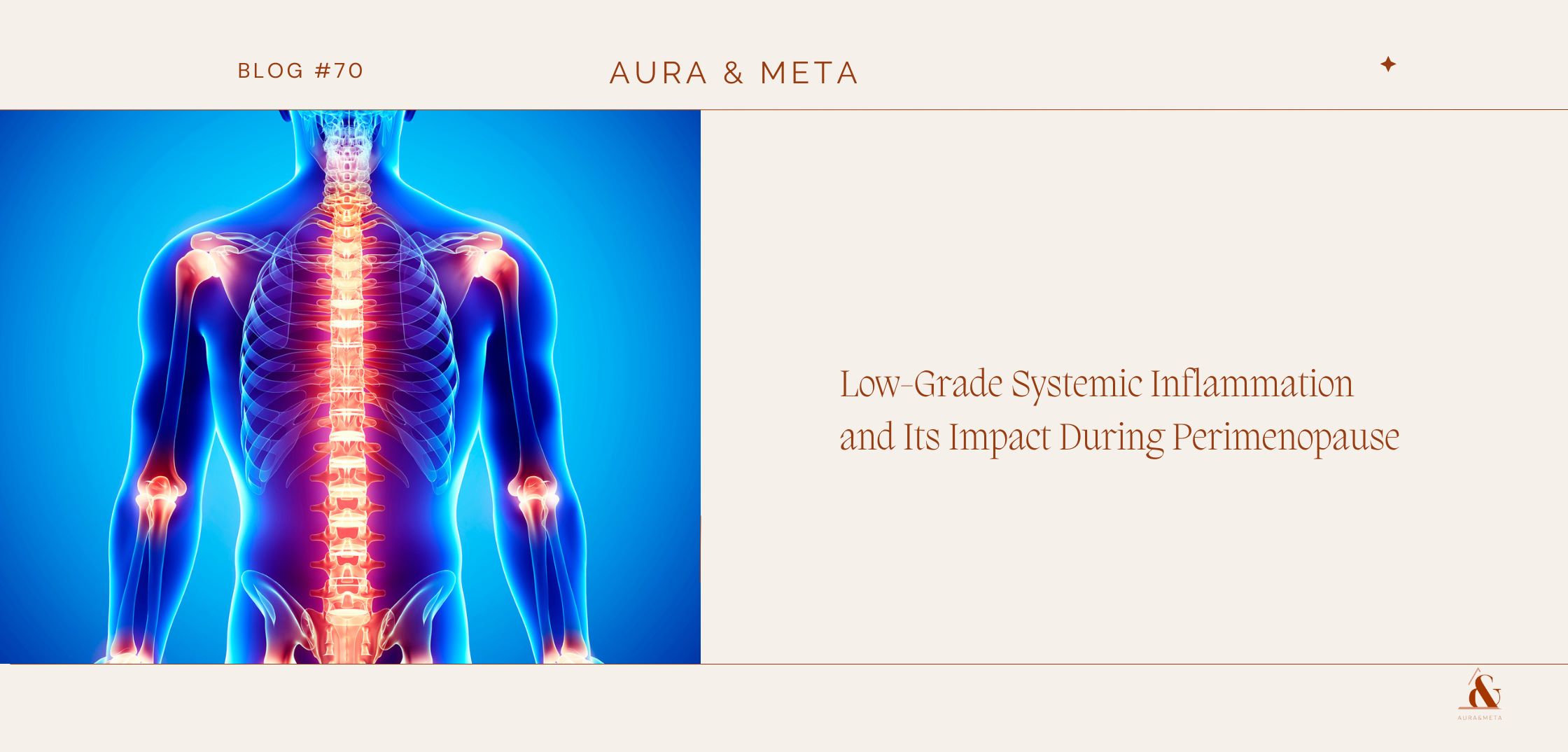Low-grade systemic inflammation is a subtle yet persistent form of inflammation that affects the entire body. Unlike acute inflammation, which is a short-term response to injury or infection, low-grade systemic inflammation is a prolonged immune response that can silently impact multiple systems over time. For women in perimenopause, this type of inflammation can significantly influence hormonal balance, energy levels, and overall well-being. Let’s explore what low-grade systemic inflammation means, how it impacts women in perimenopause, and actionable strategies to support a healthy, balanced life during this transitional phase.
What Is Low-Grade Systemic Inflammation?
Low-grade systemic inflammation is an immune response that, while subtle, can progressively lead to health issues, particularly during hormonal shifts like those experienced in perimenopause. This type of inflammation has been linked to various symptoms, including fatigue, mood swings, and increased susceptibility to chronic diseases such as heart disease and diabetes. As a holistic approach to wellness emphasizes, understanding and addressing this type of inflammation can be pivotal in managing perimenopausal symptoms effectively.
The Role of Inflammation During Perimenopause
During perimenopause, hormonal fluctuations are common as the body adjusts to lower levels of oestrogen and progesterone. This hormonal shift is a natural part of aging, yet it also makes women more vulnerable to inflammation. Here’s how it unfolds:
- Oestrogen’s Anti-Inflammatory Role: Oestrogen helps to reduce inflammation. As oestrogen levels fluctuate and decline during perimenopause, this natural anti-inflammatory effect decreases, potentially leading to a potential increase in low-grade inflammation.
- Impact on Metabolism and Weight: Many women experience changes in weight during perimenopause, partly due to metabolic shifts influenced by inflammation. This can further contribute to hormonal imbalances, as adipose tissue (body fat) can promote inflammatory processes.
For those looking to understand their unique hormonal profile and inflammation levels, functional testing options like the DUTCH Test provide valuable insights into how hormone changes may be affecting inflammation and overall health.
Recognizing Symptoms of Low-Grade Inflammation
The signs of low-grade inflammation can often be mistaken for typical perimenopausal symptoms. However, understanding these subtle cues can help you better manage your health:
- Chronic Fatigue: Unrelenting tiredness that doesn’t improve with rest can be a key symptom of inflammation.
- Mood Swings and Brain Fog: Inflammation can affect brain function, contributing to mood changes and reduced cognitive clarity.
- Joint Pain and Muscle Stiffness: These symptoms are often associated with inflammation, which can exacerbate joint discomfort during perimenopause.
These subtle but persistent symptoms are often the body’s way of signalling an inflammatory state. By focusing on nutritional therapy and lifestyle modifications, you can support your body’s natural ability to reduce inflammation and manage symptoms effectively.
The Gut-Inflammation Connection
The gut plays a significant role in regulating inflammation throughout the body. An imbalance in the gut microbiome, known as dysbiosis, can contribute to systemic inflammation. During perimenopause, hormonal fluctuations can disrupt the balance of bacteria in the gut, leading to increased inflammation and a range of symptoms, including digestive discomfort and mood changes.
Supporting gut health can be a powerful way to manage inflammation. Consuming a diet rich in fibre, probiotics, and anti-inflammatory foods can promote a balanced gut microbiome and support overall wellness. For more information on managing gut health and inflammation, explore our functional testing options for Women’s Wellness.
How to Manage Low-Grade Systemic Inflammation During Perimenopause
Effective management of inflammation requires a holistic approach that includes nutrition, lifestyle changes, and stress management. Here are some actionable strategies to consider:
- Anti-Inflammatory Diet: Incorporate foods rich in omega-3 fatty acids (such as salmon and flaxseeds), antioxidants, and fibre to support the body’s anti-inflammatory response. Avoid refined sugars and processed foods, which can exacerbate inflammation.
- Regular Physical Activity: Gentle, consistent exercise like walking, yoga, or swimming can reduce inflammation and boost energy levels. Aim for a balanced approach, as excessive high-intensity exercise can sometimes promote inflammation.
- Stress Management: Chronic stress triggers inflammation. Techniques like mindfulness meditation, deep breathing, and spending time in nature can help reduce stress levels and, in turn, inflammation. Our approach to wellness at Aura & Meta emphasizes the importance of managing stress as part of holistic health.
- Hormone Balance Support: Since hormonal changes contribute to inflammation, exploring natural ways to support hormone balance can be beneficial. Phytoestrogens (found in foods like soy and flaxseed) can help modulate oestrogen levels. For personalized recommendations, genetic testing can offer insights into your unique nutritional needs.
The Role of Neuroenergetic Kinesiology in Supporting Inflammation Reduction
At Aura & Meta, we incorporate neuroenergetic kinesiology to support reducing stresses around inflammation. This holistic practice identifies blockages in the body’s energy pathways that may be contributing to symptoms. By addressing these blockages, kinesiology can support the body’s natural healing processes, fostering balance and well-being.
Functional Testing for a Personalized Approach
Understanding your body’s unique response to inflammation is crucial for effective management. Functional testing offers valuable insights into how your body manages inflammation and its root causes. Testing options such as the DUTCH Test and Women’s Hormones Testing provide a comprehensive view of hormonal health and inflammation markers, allowing for tailored recommendations that address the root of your symptoms.
Embracing Wellness During Perimenopause
Low-grade systemic inflammation can impact both physical and emotional well-being during perimenopause, but with a proactive and informed approach, it is manageable. Understanding how inflammation affects your body enables you to make empowering choices for your health. From balanced nutrition to neuroenergetic kinesiology, Aura & Meta provides a holistic approach to help you navigate perimenopause with resilience, confidence, and vitality.
If you’re ready to take control of your health during perimenopause, book a consultation with us. Together, we’ll create a personalized wellness plan that addresses inflammation and supports your journey to optimal health and well-being.

